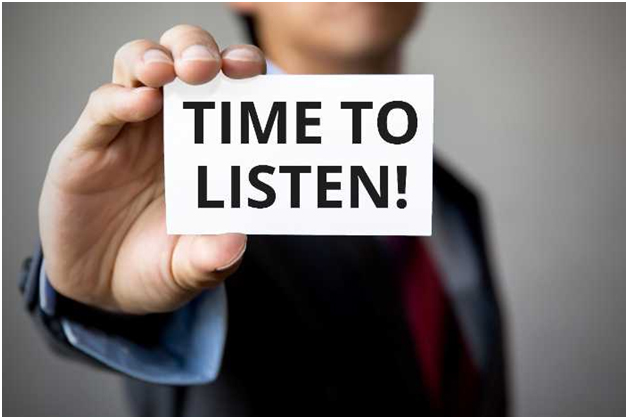
Why Active Listening Skills Are Essential for Lawyers to Possess?
Lawyers should be aware of how important active listening is for success in their profession. They should develop the skill to be a great listener. Effective and good listening is a vital skill to possess because it allows them not just to hear but also understand what another person may or could mean when they speak, which helps build rapport between attorney and client and broaden understanding on both sides about any given situation at hand. So there can eventually come a conclusion where everyone feels satisfied with the results regardless if one side was technically correct. Listening well is one of the subtle but pivotal decisions in a lawyer’s journey, as outlined in the article on the 18 most important legal-career decisions.How Can Lawyer-Client Communication Lead to Client Satisfaction?
Satisfied clients are the key to any successful law practice. When clients feel that their lawyer is genuinely listening and paying attention to them and considering their needs, they are more likely to be satisfied with the outcome of their case. In addition, lawyer-client communication can help to build trust and rapport between the lawyer and the client. This is important because clients need to feel that they can trust their lawyer to feel comfortable sharing information about their case and their legal system process. One of the key barriers to deep listening is the attorney’s own emotional agenda, as discussed in BCGSearch’s piece on how the need to feel important and loved undermines true client engagement. Counsel who feel chronically overloaded will struggle to listen well — as the article on what lawyers truly need to know about work-life balance explores.Lawyer-client communication is essential to the success of any legal case. By taking the time to listen accurately to their clients, lawyers can better understand the situation and provide better representation. In addition, lawyer-client communication can help to build trust and rapport between the lawyer and the client. This is important because clients need to feel that they can trust their lawyers to feel comfortable sharing information about their cases. Excellent lawyer-client communication can lead to satisfied clients, which is essential to the success of any law practice. From the start of your career, the ability to listen and respond to clients and supervisors is key — as described in how any attorney … can get a job with a large law firm and succeed there.
Active Listening Exercise That Makes Better Lawyers
As lawyers, hearing and understanding your client's story and body language is imperative. That way, you can create critical and helpful responses and advice for your clients. Here is an excellent reminder of how active listening skills can give you various benefits.- When you talk with a client, maintain eye contact and try not to get distracted by other things in the room or your mind.
- Pay attention to both what the client is saying and how they are saying it. This will help you understand not only the words they are speaking but also the emotions they are conveying.
- Try to repeat what the client has said to you in your own words to show that you genuinely listen and understand them. This will help to build trust between you and the client.
- Finally, make sure to ask questions if you need clarification on anything. This will show that you are interested in what the client is saying and want to understand their situation thoroughly.
Effective listening depends on foundational traits; for example, the article on the most important characteristic attorneys need to succeed highlights the often-overlooked inner work required for client trust
Benefits of Following Active Listening Exercise
Active listening can help attorneys to:- Build trust between lawyer and client
- Show that you are genuinely interested in what the client has to say
- Help you to understand the emotions that the client is conveying
- Lead to satisfied clients
- Improve lawyer-client communication skills
- Build rapport between lawyer and client
- Help you to understand the client's story
- Provide better representation for your clients
Active Listening: Listen Like a Lawyer
The ability to listen is critical for lawyers. Listening is the key to success in lawyer-client relationships and lawyer-client communication. By being better listeners, lawyers can build trust with their clients, understand their clients' stories, and provide better representation. Even seasoned lawyers can fall into what BCGSearch calls the “Senior Attorney Trap”, which may undermine client-listening by complacency or role inertia.Lawyers can use many active listening techniques to improve lawyer-client communication. One technique is to focus on both what the client is saying and how the client is saying it. Another technique is to repeat to the client what they have said in their own words. This will help the lawyer understand the client's story and show that you truly listen to the client. Despite the prestige of large firms, the shift away from client-centred listening is noted in the piece on top 10 reasons many lawyers prefer large famous firms.
By using active listening techniques, lawyers can improve lawyer-client communication and provide better representation for their clients. Active and good listening is the key to success in lawyer-client relationships.
When Should Lawyers Stop Talking?
It is sometimes crucial for lawyers to stop talking and just listen. One time when this is important is when the client is sharing their story. This is the time for the lawyer to build trust with the client and understand their story. It is also crucial for lawyers to stop talking when they need clarification from the client. This will show that you are interested in what the client is saying and want to understand their situation.Lawyers should stop talking and start listening when trying to build trust with their clients, understand their stories, or need clarification from the client. Listening is the key to success in lawyer-client communication.
The art of lawyer-client conversation: How to talk so your clients will listen.
Lawyers need to be able to hold conversations with their clients. This is the time for attorneys to build trust, understand their stories, and provide better representation.
What Happens When Lawyers Don't Listen to Their Clients?
Lawyers who don't listen to their clients will miss important information. This can lead to misunderstandings and client dissatisfaction. Lawyer-client communication is essential for building trust and understanding the client's story. Lawyers can improve lawyer-client communication and provide better representation for their clients by being better listeners. Individual skill matters — but firm culture sets the tone. For example, this article on why the culture of the law firm you are working for will determine … underscores how listening-friendly cultures matter.How Can Lawyers Improve Lawyer-Client Communication?
Lawyers can improve lawyer-client communication by using active listening techniques. One technique is to focus on both what the client is saying and how the client is saying it. Another technique is paraphrasing the client's words to grasp the relevant details or information. This will help the lawyer to understand the client's story and show that you are truly listening to the client.By using active listening techniques, lawyers can improve lawyer-client communication and provide better representation for their clients. Active listening is the key to success in lawyer-client relationships. Finally, as the legal industry evolves, this article on law firms and their future in the changing legal industry reminds us that client-centric skills like listening will become even more vital.




